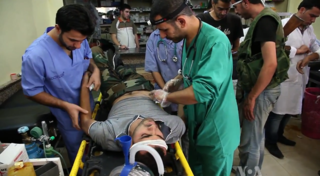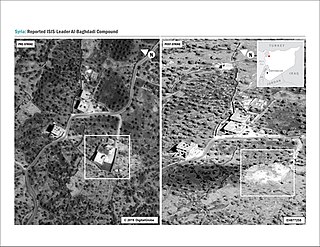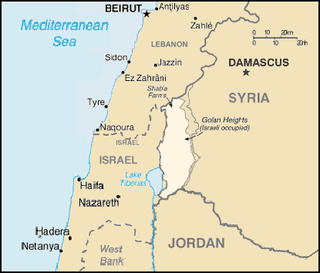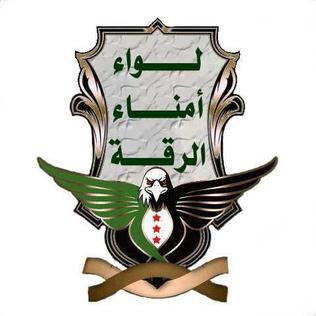 W
WThe Syrian civil war is an ongoing multi-sided civil war in Syria fought between the Ba'athist Syrian Arab Republic led by Syrian President Bashar al-Assad, along with domestic and foreign allies, and various domestic and foreign forces opposing both the Syrian government and each other in varying combinations.
 W
WEstimates of the total number of deaths in the Syrian Civil War, by opposition activist groups, vary between 387,100 and about 593,000 as of December 2020. On 23 April 2016, the United Nations and Arab League Envoy to Syria put out an estimate of 400,000 that had died in the war. Based on Syria's pre-war population of 20.8 million from 2011, this represented approximately 2% of Syria's pre-war population.
 W
WOn October 26–27, 2019, the United States conducted Operation Kayla Mueller, a military operation named after Kayla Mueller, that resulted in the death of Abu Bakr al-Baghdadi, the then-leader and self-proclaimed caliph of the Islamic State of Iraq and the Levant (ISIL) terrorist organization. The operation took place in the outskirts of Barisha, Idlib Governorate, Syria. According to General Kenneth "Frank" McKenzie, the United States Central Command (CENTCOM) commander who oversaw the operation, Baghdadi killed himself along with two children when he detonated a suicide belt while seeking to evade the U.S. forces during the raid.
 W
WThe early insurgency phase of the Syrian Civil War lasted from late July 2011 to April 2012, and was associated with the rise of armed oppositional militias across Syria and the beginning of armed rebellion against the authorities of the Syrian Arab Republic. Though armed insurrection incidents began as early as June 2011 when rebels killed 120–140 Syrian security personnel, the beginning of organized insurgency is typically marked by the formation of the Free Syrian Army (FSA) on 29 July 2011, when a group of defected officers declared the establishment of the first organized oppositional military force. Composed of defected Syrian Armed Forces personnel, the rebel army aimed to remove Bashar al-Assad and his government from power.
 W
WThe federalization of Syria has been proposed as a way to end the Syrian Civil War. In the broadest sense, it means turning the centralized Syrian Arab Republic into a federal republic with autonomous subdivisions. Many powers and actors involved in the Syrian Civil War have entertained the idea of "federal division", not least among them Russia, United Nations representatives, and the United States. President Bashar al-Assad has not ruled out the possibility of a federal democratic state of Syria. Turkey is strongly hostile towards the idea of federalization in Syria because it fears possible repercussions for its own highly centralized state.
 W
WThe Golan Heights, or simply the Golan, is a region in the Levant, spanning about 1,800 square kilometers (690 sq mi). The region defined as the Golan Heights differs between disciplines: as a geological and biogeographical region, the Golan Heights refers to a basaltic plateau bordered by the Yarmouk River in the south, the Sea of Galilee and Hula Valley in the west, the Anti-Lebanon with Mount Hermon in the north and Wadi Raqqad in the east. As a geopolitical region, the Golan Heights refers to the area captured from Syria and occupied by Israel during the 1967 Six-Day War, territory which has been administered as part of Israel since 1981. This region includes the western two-thirds of the geological Golan Heights and the Israeli-occupied part of Mount Hermon.
 W
WSeveral incidents have taken place on the Israeli–Syrian ceasefire line during the Syrian Civil War, straining the relations between the countries. The incidents are considered a spillover of the Quneitra Governorate clashes since 2012 and later incidents between Syrian Army and the rebels, ongoing on the Syrian-controlled side of the Golan and the Golan Neutral Zone and the Hezbollah involvement in the Syrian Civil War. Through the incidents, which began in late 2012, as of mid-2014, one Israeli civilian was killed and at least 4 soldiers wounded; on the Syrian-controlled side, it is estimated that at least ten soldiers were killed, as well as two unidentified militants, who were identified near Ein Zivan on Golan Heights.
 W
WRojava–Kurdistan Region relations refers to the relationship between the Autonomous Administration of North and East Syria, and the Government of Iraq's Kurdistan Region. While they share much culturally, they also have many political differences. There has been military cooperation with Kurdistan Region and the United States in the conflict against Islamic State of Iraq and the Levant (ISIL), although neither gives official support for Rojava or its People's Protection Units (YPG). The Kurdistan Regional Government enforced a unilateral economic blockade against Rojava which has damaged and limited the region's economy. The "Sultanistic system" of Iraqi Kurdistan stands in stark contrast to the democratic confederalist system of the Rojava.
 W
WLiwa Umana al-Raqqa, also known as the "Brigade of the Trustees of Raqqa" was an armed Syrian rebel group participating in the Syrian Civil War established in 2013 in the Raqqa Governorate as a subunit of Ahrar al-Sham.
 W
WSince the start of the Syrian Civil War, all sides have used social media to try to discredit their opponents by using negative terms such as 'Syrian regime', 'armed gangs/terrorists', 'Syrian government/US State Department propaganda', 'biased', 'US/Western/foreign involvement'. According to the Stockholm International Peace Research Institute, given the complexity of the Syrian conflict, media bias in reporting remains a key challenge, plaguing the collection of useful data and misinforming researchers and policymakers regarding the actual events taking place.
 W
WAANES–Syria relations concern the military and political relations between the Ba'athist Syrian Arab Republic and the Autonomous Administration of North and East Syria (AANES), a de facto autonomous multi-ethnic region in northern and eastern Syria. The Syrian government does not officially recognise the autonomy of the AANES, and advocates a centralist approach to the governance of Syria. The AANES seeks the federalisation of Syria. For most of the Syrian civil war, there has been a non-aggression pact between the military of Syria and the Syrian Democratic Forces, with occasional confrontations and some cooperation against Islamist groups, in particular against the Turkish Armed Forces and the Turkish-backed Syrian National Army.
 W
WThe Syrian Civil War is an intensely sectarian conflict. The focus of the conflict has been identified by some as a ruling minority Alawite government and allied Shi'a governments such as Iran, pitted against the country's Sunni Muslim majority who are aligned with the Syrian opposition and their Sunni Turkish and Persian Gulf state backers. Others, such as the blogger Neil Clarke, identify it as the secular Syrian government, made up of all religious groups pitted against the Islamist opposition. However, Sunni Muslims make up the majority of the Syrian Arab Army and many hold high governmental positions, while Alawites and members of almost every minority have also been active on the rebel side.
 W
WSyria Relief is the largest Syria-focused NGO in the United Kingdom. Syria Relief state that they "are dedicated to alleviating the suffering and supporting the future of Syrians who have been affected by the crisis, mainly inside Syria." Syria Relief were formed in 2011 at the start of the Syrian Civil War, since then they have reached millions of people, distributing "hundreds of millions" worth of aid. The charity was initially set up as a short-term humanitarian aid project at the start of the conflict, however it has since grown in size. The charity operates a total of 306 schools in Syria, more than any other NGO.
 W
WThe Council of the Syrian Charter is a Syrian civil society body which officially announced its establishment in spring 2019 to bring together representatives from different families, regions, clans, tribes and religious communities from throughout Syria and from across the Syrian diaspora.
 W
WThis is a broad timeline of the course of major events of the Syrian Civil War. It only includes major territorial changes and attacks and does not include every event.
 W
WThe Northern Syria Buffer Zone was a temporary Syrian Civil War demilitarized zone (DMZ) established on the Syrian side of the Syrian-Turkish border in August 2019 to maintain security along the border and to dissuade a prospective Turkish invasion of the self-proclaimed Autonomous Administration of North and East Syria. The DMZ was administered by the Kurdish-led Syrian Democratic Forces (SDF) and their military councils and enforced by United States Armed Forces and Turkish Armed Forces personnel.
 W
WThe Second Northern Syria Buffer Zone, part of the Sochi Agreement, is a buffer zone in northern Syria between the Turkish Armed Forces (TAF) and the Syrian Democratic Forces (SDF). It was set up following a memorandum of understanding in the Russian city Sochi on 22 October 2019 by the Russian and Turkish presidents during the 2019 Turkish offensive into north-eastern Syria. Most of the zone is controlled by the Syrian Army and Russian Military Police, and some by the TAF.